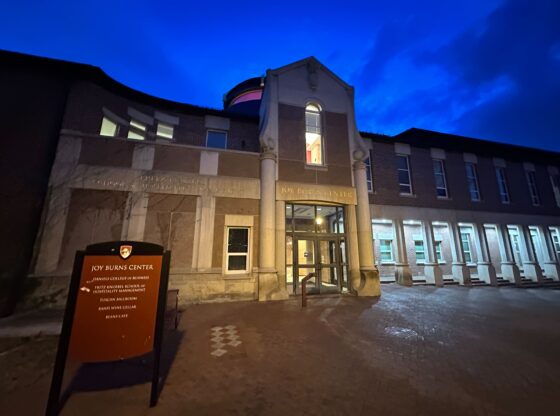The pro-Palestine encampment, though now disbanded, garnered an unprecedented amount of attention for DU student activists. Although students occupied the majority of the spotlight, another visible presence at the protest was the group of volunteer faculty and staff marshals surrounding the camp.
These marshals were not affiliated with DU4Palestine or any other student activist group. Rather, they were present at the protest to serve as a buffer to keep students safe.
“The primary goal of the faculty and staff marshals was to keep students safe and protect academic freedoms,” said Chris Fazzari, a faculty marshal and recent DU graduate who currently works for the university. “Marshals would be wearing yellow neon vests and station ourselves on the borders of the encampment to form physical barriers between protesters and counter-protests, help de-escalate situations from anger to intellectual dialogue and to advocate for all our students.”
“I personally view my role as a faculty and staff marshal as to keep all students safe. Student speech is vital to both university communities and society at large. This speech should be protected, and all students should be kept safe and in a space to have thoughtful and impassioned debate, a cornerstone of what a university is for,” Fazzari added.
Despite this comparatively passive role, some marshals were subject to shocking mistreatment throughout the duration of the protest, largely from counter-protesters and community members who were opposed to the encampment.
“There were some individuals who would frequently come by and be really aggressive and hateful. I was witness to some counter-protesters yelling especially at the faculty and staff marshals things like ‘You are going to get fired for this, you are going to have to go work at Starbucks,’ which honestly, were some of the most tame things that were screamed at me particularly, as I frequently marshaled at night,” said Fazzari.
Despite the administration’s insistence on engaging in respectful dialogue, the treatment of the marshals displayed behavior that was anything but.
“I personally was the subject of some very intense and horrible homophobic attacks. Which, for anyone, is a really horrible experience but reassured my role as a marshal, as I would much rather students yell homophobic things at me than a student in the encampment,” said Fazzari. “Many students in the encampment expressed to me the immensely real concern of: ‘how am I assumed to walk past the person who just called me a f—-t in Sturm?’”
However, despite the harassment the marshals endured, they played a key role as observers of the protest, providing another set of eyes on the events.
“I saw students from in and outside the encampment engage each other in really thoughtful dialogue and debate that I think is part of the core of the university experience. I also saw really horrible things. I saw people be physically aggressive, I saw people scream incredibly homophobic, fatphobic, islamophobic and overall, really hateful things,” said Fazzari. “The people yelling at the students in the encampment defaulted a lot to yelling that the protesters were r—–ds and f—-ts, I heard ‘you’re a fat f–k,’ ‘people like you are killed in Gaza,’ and you dress like a terrorist.’”
Throughout the protest, the DU community was informed through various official communications about many incidents of discrimination. However, information on the nature and source of these attacks was not provided. Faculty marshals once again provided crucial insight.
“The emails being sent to the university about the encampment painted a very specific picture of what was occurring that did not reflect what I saw while I was there,” said Fazzari. “I did not witness any antisemitism or violence coming from inside the encampment. I witnessed the DU higher administration make their own, unexplained choices while they went around and ignored their traditional policymaking process and ignored the people and committees that were supposed to manage such an event.”
In addition to observing the camp, the marshals were also able to observe the attitudes and actions of the administration, seemingly to the chagrin of said administrators.
“I was really disappointed that the administration seemed overall annoyed that faculty and staff were there. Some administration officials, I felt, were incredibly rude to me, personally,” said Fazzari. “From the things I witnessed, I felt as though the administration was trying to escalate situations while the marshals were there to de-escalate. I think it’s important to state that Chancellor Haefner never came to the encampment. The highest-ranking administration official I ever interacted with at the encampment was Provost Mary Clark.”
The importance of observations like these cannot be understated. The few weeks during which the encampment was a constant facet of DU student life were filled with confusion, uncertainty and conflicting narratives. Though passive, the presence of faculty and staff marshals provided at least a small buffer to the chaos.
From initiatives like Divest DU to the No More Pios movement, there is no shortage of social issues that matter deeply to DU students. Should we see more such instances of disruptive student activism in the near future, these volunteers should serve as a shining example of our community coming together to protect our right to protest.








